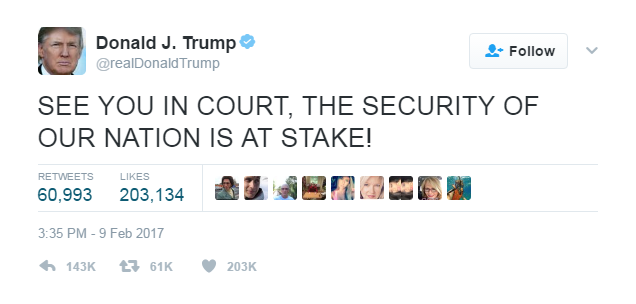After a tumultuous few weeks of chaos, global condemnation and law suits, the 9th Circuit Court of Appeals issued its highly anticipated decision on Thursday, refusing to reinstate Trump’s travel ban. The case will likely continue to make its way through the court system and possibly the Supreme Court, but for now this means that there is no travel ban for nationals of any countries. CBP will continue to admit travelers from all over the world including nationals from the 7 designated countries – Iran, Iraq, Libya, Sudan, Somalia, Syria and Yemen. US embassies and consulates around the world will continue to issue nonimmigrant and immigrant visas to applicants of these 7 countries.
Here’s a recap of the last two weeks:
- On Friday, January 27th, 2017, Trump signed an Executive Order, titled “Protecting The Nation From Foreign Terrorist Entry To The United States.” The EO went into effect immediately creating chaos around the world as travelers from the 7 designated countries were prohibited from boarding flights to the United States and travelers in mid-flight were put on a plane back home after arriving in the United States. For more on the specifics of the EO, see our previous post on January 30, 2017.
- As of February 2, 2017, CBP had recommended “Denial of Boarding” to 1,222 people, granted 87 waivers and processed 1,610 green card waivers. It took a few days, but the government eventually confirmed that permanent residents (i.e. green card holders) with passports from one of the 7 designated countries would be admitted in the “national interest.” CBP also confirmed that dual nationals presenting passports from unrestricted country would be admitted to the United States (for example, someone born in Sudan with a UK passport could enter the United States with their UK passport). Canadian landed immigrants traveling from Canada were also exempt from the travel ban. US embassies and consulates also confirmed that dual nationals could still apply for nonimmigrant and immigrant visas if applying with a passport from an unrestricted country.
- During this week of chaos, USCIS confirmed that it would continue adjudicating all applications for benefits and that the EO did not impact nationals from these 7 countries who were already in the United States. This meant that USCIS would continue to adjudicate F-1 OPT applications, nonimmigrant visa applications (e.g. F-1, H-1B, O-1, L-1, etc.), immigrant visa applications for green cards, citizenship applications, etc. for nationals of these 7 designated countries.
- On Friday, February 3, 2017, a Washington state judge, James Robart, issued a nationwide order temporarily banning the enforcement of the travel ban. CBP immediately confirmed that airports were “back to normal” processing and travelers from the 7 countries have been admitted to the United States since then. US embassies and consulates, after provisionally revoking approximately 100,000 visas, rescinded this order and these visas were once again deemed “valid.”
- On Saturday, February 4, 2017, the DOJ filed an emergency request to the 9th Circuit Appeals Court. The 9th Circuit declined to issue an emergency stay but held hearings on Tuesday, February 7th, 2017.
- On Thursday, February 9th, the 9th Circuit in a 3-0 decision (with a 29-page decision) declined to reinstate Trump’s travel ban.

The situation remains fluid with Trump calling this latest ruling as a “disgraceful decision” and promising to take it all the way to the Supreme Court. But for now, there is no travel ban and nationals from these 7 designated countries, as well as refugees, may continue to enter the United States. The impact of the last few weeks has not only created an unprecedented level of anxiety for nationals of these 7 countries, but also for many foreign nationals from all over the world who love America, who contribute to America and who call the United States “home.”
In this uncertain time, we at Loke Walsh Immigration stand with Immigrants in support of “our” America.
